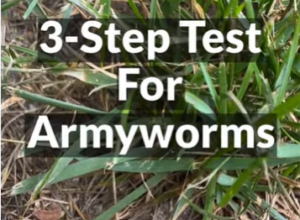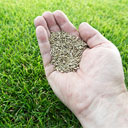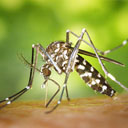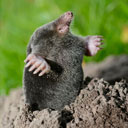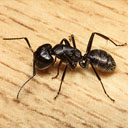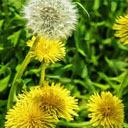Get The Scoop On Armyworms
Last updated: 07/20/2022
Estimated read time: 2.5 minutes
What are army worms?
Armyworms aren’t worms at all—rather, they are caterpillars of the armyworm moth. These pests feed in large numbers, decimating lawns, gardens, and crops astoundingly fast. To give you an idea of their speed—they can consume a football field in 2-3 days!
Our soil scientists are here to offer you tips on how to repair, protect, and (most importantly) prevent armyworm damage.
What do army worms look like?
In the larval stage, armyworms have yellow, red, brown, or green stripes along their sides and back and measure between 1.5 to 2 inches long. They are commonly spotted at dusk or in the early mornings.
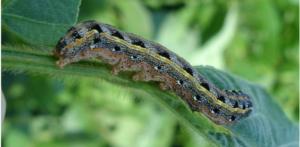
Once matured into moths, armyworms appear brown and dark gray with light and dark tones, though their underwings are a white/pale gray, with a wingspan of about 1.5 inches.
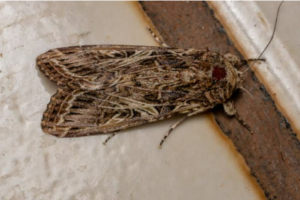
6 signs of army worm damage
Brown, discolored, or dying grass can be a sign of all sorts of lawn problems including summer patch and dollar spot and other common lawn diseases, grubs, drought stress, and improper lawn care just to name a few, however, there are generally more signs that appear when you have (or already suffered from) an armyworm infestation.
6 signs of army worm damage
- Discolored grass that lays flat
- Brown patches, especially along the perimeter, making their way inward
- Chewed, jagged grass tips or transparent segments in grass blades
- Bald spots, where they’ve eaten entire grass plants down to the soil
- Increased or unusual bird activity on your lawn
- Movement: Your lawn may look like it is moving on its own
Where do I check for Armyworms?
Look at your property line, as well as uniformly across your yard. Armyworms will often move into areas from weeds along the edges and fence lines. As a result, applying treatment along the yard perimeters may be effective.
Does dawn dish soap kill armyworms?
Dish soap does not kill armyworms but can be used to detect if you have an armyworm infestation.
The army worm soap test uses a mixture of dish detergent and water, which is then poured on the weakest part of your lawn. The soap irritates the skin of the armyworm causing them to surface, making it easier to see and identify armyworms in your lawn. Here’s a quick video showing how to do the soap test on a small part of your lawn:
What does Army worm Damage look like?
Armyworms are surface feeders. As they eat, the larvae leave ragged or transparent grass blades, brown or bare circular patches on the lawn, and may even crop your grass to the ground. Here are two examples of army worm damage:
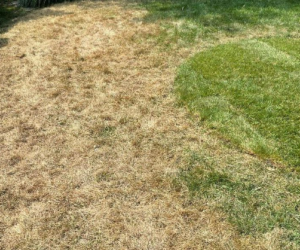
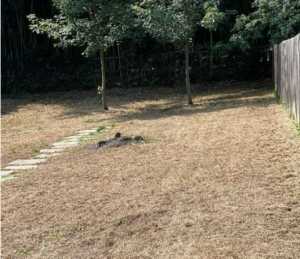
What kind of Grass do Armyworms eat?
Armyworms will devour a variety of grasses, including:
- Bermuda grass
- St. Augustine grass
- Tall Fescue
- Fine Fescue
- Bluegrass
- Ryegrass
- Bentgrass
- And more
Unfortunately, most grasses, like Ryegrass and Fescue, may not be able to recover after suffering an armyworm infestation. Some grasses, like actively growing Bermuda grass, may be able to recuperate, due to their aggressive growth habit.
Army worm stages
Armyworms have four distinct life stages: egg, larva, pupa, and adult.
After mating at night, the female armyworm can lay 100-200 eggs, which they attach to leaves. Newly hatched larvae feed on the leaf and eventually lower themselves to the turf to feed by spinning a silken thread.
Most defoliation will occur in the larva stage, where they will quickly consume more than 93% of the total foliage they will eat over their entire life span. Armyworm caterpillars will feed for two to four weeks before pupating in the soil. Fully developed moths appear about two to four weeks later.
How to prevent Armyworms?
Here are some easy tips that can help you prevent armyworms from invading your lawn:
- Aerate and seed your lawn every year.
- Water your lawn deeply several times a week instead of frequent, light watering.
- Mow your property to the proper height.
- Fertilize your lawn, adding nutrients high in nitrogen.
- Manually check for armyworm larvae and moths EVERY DAY.
Note that if you already have these insects in your yard, treatment is the only way to eliminate them. Our current treatment program is made up of two applications; however, our approach will be modified to best treat them as there are potentially multiple generations expected in our region.
What kills army worms?
The best way to kill army worms is to use a targeted insecticide in infested areas, especially early on in the insects’ life cycle. Be sure to apply the treatment very carefully to avoid killing beneficial insects. To ensure success, we recommend reaching out to a professional lawn service company. Click here to learn more about our Armyworm Treatment
Don't Let Armyworms Kill Your Lawn
Armyworm Damage
"*" indicates required fields
Related Resources
Expert Lawn Care Professionals Serving Maryland & Northern Virginia
You know every spring when your neighbor’s yard looks like it’s full of doggy doo. It’s actually not. They ordered aeration and seeding for their bald and patchy grass. How’s your grass lookin’?
There is nothing worse than having some sweet tea in a storm of mosquitos and your animals full of ticks. Let us make your outdoor activities stress-free!
There is nothing worse than your good looking trees getting infected by pests and having to call all out the tree folks to chop it down. We’ll make your trees and shrubs protected and help them live a long life.
Imagine playing catch with your kids or playing croquet and tripping over mounds and holes created by nasty, pesky rodents… we’ll take care of it and no ankles will get broken.
Our individualized plans are designed to get rid of pests on your property while also using some of the safest products that have passed both EPA inspection and our own safety qualifications.
Your home’s landscape beds are a major part of your property’s curb appeal. No one wants passerbys commenting on your unsightly beds! Let us make your property a hit.

